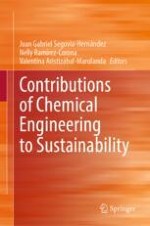2024 | OriginalPaper | Buchkapitel
11. Bio-Jetfuel an Alternative to Achieve a Sustainable Aviation Industry. Case Study of Mexico Considering Economic, Environmental and Social Aspects
verfasst von : Gabriel Contreras-Zarazúa, David Vallejo-Blancas, Eduardo Sánchez-Ramirez, Cesar-Ramírez Márquez, Juan Gabriel Segovia-Hernández, Juan José Quiroz Ramírez
Erschienen in: Contributions of Chemical Engineering to Sustainability
Verlag: Springer Nature Switzerland
Aktivieren Sie unsere intelligente Suche, um passende Fachinhalte oder Patente zu finden.
Wählen Sie Textabschnitte aus um mit Künstlicher Intelligenz passenden Patente zu finden. powered by
Markieren Sie Textabschnitte, um KI-gestützt weitere passende Inhalte zu finden. powered by
